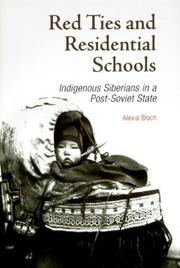| Listing 1 - 6 of 6 |
Sort by
|
Book
ISBN: 9781501709418 1501709410 9781501712050 1501712055 9781501713149 1501713140 1501713159 Year: 2017 Publisher: Ithaca : Cornell University Press,
Abstract | Keywords | Export | Availability | Bookmark
 Loading...
Loading...Choose an application
- Reference Manager
- EndNote
- RefWorks (Direct export to RefWorks)
"Sex, Love, and Migration goes beyond a common narrative of women's exploitation as a feature of migration in the early twenty-first century, a story that features young women from poor countries who cross borders to work in low paid and often intimate labor. Alexia Bloch argues that the mobility of women is marked not only by risks but also by personal and social transformation as migration fundamentally reshapes women's emotional worlds and aspirations. Bloch documents how, as women have crossed borders between the former Soviet Union and Turkey since the early 1990s, they have forged new forms of intimacy in their households in Moldova, Ukraine, Belarus, and Russia, but also in Istanbul, where they often work for years on end. Sex, Love, and Migration takes as its subject the lives of post-Soviet migrant women employed in three distinct spheres--sex work, the garment trade, and domestic work. Bloch challenges us to decouple images of women on the move from simple assumptions about danger, victimization, and trafficking. She redirects our attention to the aspirations and lives of women who, despite myriad impediments, move between global capitalist centers and their home communities"--
Post-communism --- Transnationalism --- Women foreign workers --- Foreign women workers --- Women alien labor --- Migrant women labor (Foreign workers) --- Migrant women workers (Foreign workers) --- Women migrant labor (Foreign workers) --- Women migrant workers (Foreign workers) --- Foreign workers --- Women employees --- Trans-nationalism --- Transnational migration --- International relations

ISBN: 9780812237597 0812237595 0812293622 Year: 2004 Publisher: Philadelphia, Pa. : University of Pennsylvania Press,
Abstract | Keywords | Export | Availability | Bookmark
 Loading...
Loading...Choose an application
- Reference Manager
- EndNote
- RefWorks (Direct export to RefWorks)
In this book Alexia Bloch examines the experiences of a community of Evenki, an indigenous group in central Siberia, to consider the place of residential schooling inidentity politics in contemporary Russia. Residential schools established in the 1920s brought Siberians under the purview of the Soviet state, and Bloch demonstrates how in the post-Soviet era, a time of jarring social change, these schools continue to embody the salience of Soviet cultural practices and the spirit of belonging to a collective. She explores how Evenk intellectuals are endowing residential schools with new symbolic power and turning them into a locus for political mobilization.In contrast to the binary model of oppressed/oppressor underlying many accounts of state/indigenous relations, Bloch's work provides a complex picture of the experiences of Siberians in Soviet and post-Soviet society. Bloch's research, conducted in a central Siberian town during the 1990s, is ethnographically grounded in life stories recorded with Evenk women; surveys of households navigating histories of collectivization and recent, rampant privatization; and in residential schools and in museums, both central to Evenk identity politics.While considering how residential schools once targeted marginalized reindeer herders, especially young girls, for socialization and assimilation, Bloch reveals how class, region, and gendered experience currently influence perspectives on residential schooling. The analysis centers on the ways vehicles of the Soviet state have been reworked and still sometimes embraced by members of an indigenous community as they forge new identities and allegiances in the post-Soviet era.
Evenki (Asian people) --- Ethnology --- Evenk (Peuple d'Asie) --- Anthropologie sociale et culturelle --- Education --- Avanki (Asian people) --- Avankil (Asian people) --- Chapogir (Asian people) --- Ewenki (Asian people) --- Khamnigan (Asian people) --- O-wen-kʻo (Tribe) --- Owenke (Asian people) --- Owenko (Asian people) --- Tungus (Asian people) --- Tunguses --- Arctic peoples --- Tungusic peoples --- Cultural anthropology --- Ethnography --- Races of man --- Social anthropology --- Anthropology --- Human beings --- History. --- Anthropology. --- Education. --- Folklore. --- Linguistics.
Book
ISBN: 9780812293623 Year: 2016 Publisher: Philadelphia
Abstract | Keywords | Export | Availability | Bookmark
 Loading...
Loading...Choose an application
- Reference Manager
- EndNote
- RefWorks (Direct export to RefWorks)
Book
Abstract | Keywords | Export | Availability | Bookmark
 Loading...
Loading...Choose an application
- Reference Manager
- EndNote
- RefWorks (Direct export to RefWorks)
Digital
ISBN: 9781501709418 Year: 2017 Publisher: Ithaca ; London Cornell University Press
Abstract | Keywords | Export | Availability | Bookmark
 Loading...
Loading...Choose an application
- Reference Manager
- EndNote
- RefWorks (Direct export to RefWorks)

ISBN: 0812218787 Year: 2004
Abstract | Keywords | Export | Availability | Bookmark
 Loading...
Loading...Choose an application
- Reference Manager
- EndNote
- RefWorks (Direct export to RefWorks)
| Listing 1 - 6 of 6 |
Sort by
|

 Search
Search Feedback
Feedback About UniCat
About UniCat  Help
Help News
News